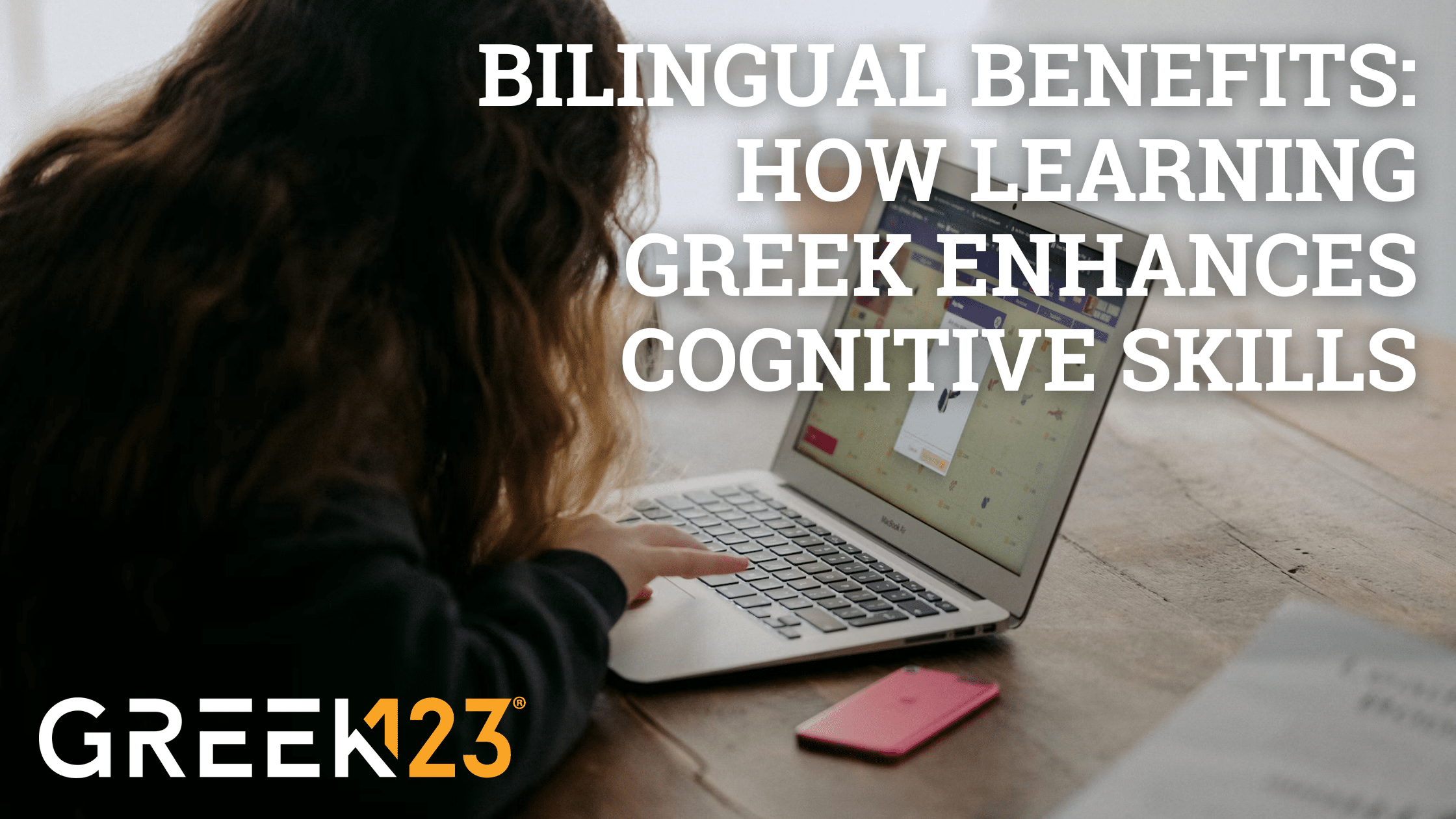
Bilingual Benefits: How Learning Greek Enhances Cognitive Skills
Bilingual Benefits: How Learning Greek Enhances Cognitive Skills
Learning a new language offers a wealth of cognitive advantages, from improved problem-solving skills to enhanced creativity. Greek, a language steeped in history and culture, provides a unique opportunity to tap into these benefits. In this article, we’ll explore the cognitive advantages of bilingualism and how learning Greek can boost brain power. So, let’s embark on a journey through the fascinating world of language and cognition.
Bilingualism and Cognitive Skills: A Dynamic Duo
Bilingualism, the ability to speak and understand two languages, has long been associated with cognitive advantages. Here’s how learning Greek can enhance various cognitive skills:
- Enhanced Problem-Solving: Bilingual individuals often exhibit better problem-solving skills. Learning Greek challenges the brain to think in different linguistic patterns, fostering creativity and adaptability when facing complex challenges.
- Improved Memory: Bilingualism has been linked to improved memory retention and recall. As you learn Greek vocabulary and grammar, your brain becomes more adept at storing and retrieving information, a skill that extends to other areas of life.
- Heightened Focus and Attention: Learning Greek requires concentration and attention to detail. This focus can spill over into other tasks, leading to improved concentration and a better multitasking ability
- Cognitive Reserve: Bilingualism has been shown to increase cognitive reserve, the brain’s ability to adapt to damage or age-related changes. It may delay the onset of cognitive disorders like Alzheimer’s disease.
The Greek Advantage: A Window into Ancient Wisdom
Greek is a language rich in history, philosophy, and culture. Learning it offers unique cognitive benefits:
- Linguistic Complexity: Greek is renowned for its linguistic complexity, both in its grammar and vocabulary. Here’s how this complexity can enhance cognitive abilities:
Critical Thinking and Analytical Skills: Greek grammar is intricate, with a highly inflected system of noun declensions and verb conjugations. Learning to navigate this complexity forces learners to think critically and analytically. They must discern patterns, understand the relationships between words, and make precise linguistic choices when constructing sentences. This mental exercise sharpens problem-solving skills and encourages learners to approach language with a systematic mindset.
Vocabulary Expansion: Greek vocabulary is rich and diverse, often with multiple words to express nuanced concepts. Learning Greek requires expanding one’s vocabulary in a structured manner. This process enhances memory and cognitive flexibility as learners work to remember words, understand their meanings and appropriate contexts for their use. The cognitive effort needed to acquire and retain this vocabulary can contribute to improved cognitive abilities, including memory and recall.
- Engaging with Philosophical Texts: Greek is the language of some of the world’s most profound philosophical thinkers, including Plato, Aristotle, and Socrates. Here’s how learning Greek allows you to engage with their ideas in their original language:
Deeper Insights: Philosophical texts, when read in their original language, reveal subtleties and nuances that translations may not capture fully. The Greek language, with its precision and depth, allows learners to appreciate the intricate philosophical arguments and concepts developed by these ancient thinkers. Engaging with these texts in Greek provides deeper insight into their philosophies and stimulates mental exploration and critical analysis.
Mental Stimulation: Reading and interpreting philosophical texts in Greek can be intellectually stimulating. It requires careful reading, comprehension, and the ability to grapple with abstract ideas. This mental exercise can enhance cognitive skills related to comprehension, logical reasoning, and abstract thinking.
- Cultural Immersion: Learning Greek is not just about acquiring language skills; it also opens doors to Greek culture, art, and history. Here’s how cultural immersion enhances cognitive abilities:
Broadened Perspective: Immersing oneself in Greek culture through language learning fosters a broader perspective of the world. Exposure to different cultural norms, values, and traditions encourages learners to think critically about their own cultural biases and assumptions. This enhanced cultural awareness promotes empathy and a more comprehensive understanding of diverse perspectives.
Enhanced Cultural Intelligence: Cultural immersion through language learning contributes to higher cultural intelligence (CQ). CQ involves the ability to work effectively in culturally- diverse settings, a skill increasingly valuable in our interconnected world. Learning about Greek customs, traditions, and etiquette not only enriches cultural knowledge but also hones cognitive skills related to adaptability and intercultural communication.
- Multilingual Proficiency: For individuals already proficient in another language, adding Greek to their linguistic repertoire offers further cognitive advantages:
Cognitive Flexibility: Multilingual individuals often exhibit cognitive flexibility, which involves the ability to switch between languages, adapt to different linguistic contexts, and think in multiple languages. Learning Greek alongside another language enhances cognitive flexibility, a skill that can extend beyond language use. It may lead to improved problem-solving, creativity, and adaptability in various aspects of life.
Problem-Solving Skills: Multilingualism is associated with superior problem-solving abilities. The cognitive effort required to manage and utilize multiple languages exercises the brain, making it more adept at addressing complex challenges and finding creative solutions.
Tips for Successful Bilingualism:
Consistent Practice: Consistency is key when it comes to language learning and reaping the cognitive benefits of bilingualism. Here’s how consistent practice contributes to cognitive enhancement:
Neural Plasticity: Consistent practice in language learning encourages neural plasticity, which is the brain’s ability to adapt and reorganize itself. Regular exposure to the Greek language strengthens neural connections related to language skills and cognitive functions.
Memory Consolidation: Regular practice reinforces memory consolidation. It helps learners retain vocabulary, grammar rules, and language patterns, leading to improved memory and recall.
Skill Refinement: Language learning is a skill that will benefit from regular honing. Consistent practice sharpens language skills, including speaking, listening, reading, and writing, which in turn stimulates cognitive abilities like problem-solving and critical thinking.
Immersive Learning: Immersive learning involves surrounding oneself with the language and culture as much as possible. Here’s how this approach enhances cognitive benefits:
Contextual Learning: Immersive learning provides a rich context for language acquisition. Watching Greek movies, reading Greek literature, or engaging with native speakers exposes learners to the language in authentic situations. This contextual learning reinforces comprehension and boosts the cognitive skills related to context inference and interpretation.
Enhanced Language Fluency: Immersion accelerates language fluency. Engaging with real-world language usage through conversations, media, and cultural experiences enhances not only on3e’s language skills but also cognitive abilities like quick thinking and adaptability in various situations.
Increased Cultural Awareness: Immersive learning is not limited to language but extends to culture. Exposure to Greek customs, traditions, and daily life fosters cultural intelligence. This heightened cultural awareness sharpens cognitive skills related to empathy, adaptability, and open-mindedness.
Cultural Exploration: Exploring Greek culture alongside language learning provides a holistic and enriching experience. Here’s how cultural exploration enhances cognitive benefits:
Language and Culture Integration: The integration of language and culture enriches the learning experience. Understanding cultural nuances enhances language comprehension and promotes cognitive flexibility, as learners adapt to different cultural contexts.
Stimulating Creativity: Exploring Greek culture stimulates creativity. Whether through appreciating Greek art, music, or literature, this creative stimulation can extend to cognitive enhancements, including problem-solving, critical thinking, and innovative thinking.
The Cognitive Rewards of Learning Greek
As you embark on your journey of learning Greek, remember that you’re not just acquiring a new language; you’re also enhancing your cognitive skills and broadening your horizons. Bilingualism, especially in a language as rich and diverse as Greek, offers a host of cognitive advantages, from improved problem-solving to heightened memory and focus. So, whether you’re drawn to Greek for its ancient wisdom, its vibrant culture, or simply the joy of learning, rest assured that your brain is reaping the rewards of a linguistic adventure.
Related


